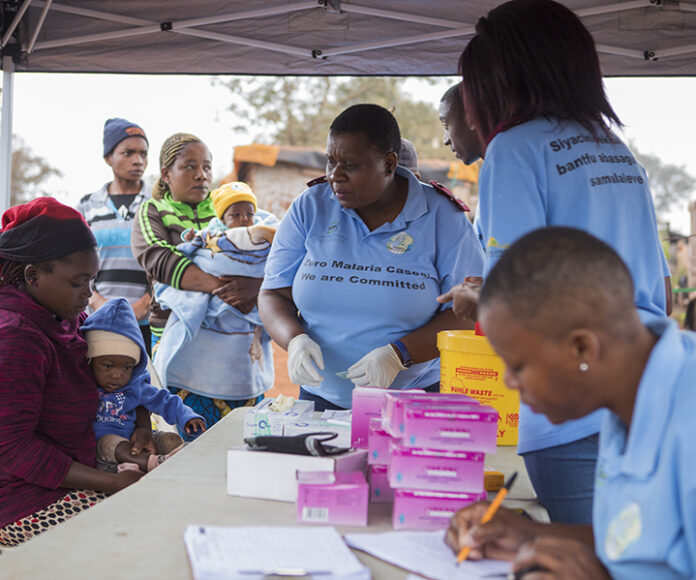The Center for Malaria and Vector-Borne Diseases (CMVBD) works to reduce the burden of malaria and vector-borne diseases through research, innovation, and training the next generation of scientists and public health leaders. CMVBD fosters the exchange of ideas and expertise and cultivates new transdisciplinary partnerships and projects among San Francisco Bay Area malaria and vector-borne disease researchers, public health leaders, and their global partners. Diseases of interest include malaria, dengue, Chagas, visceral leishmaniasis, onchocerciasis, and schistosomiasis.
Projects
The Advocacy, Financing, and Sustainability team works with national malaria programs, their partners, and donors to ensure the sustainability of the malaria response through policy, advocacy, and resource mobilization. The Malaria Elimination Initiative has developed a unique and specialized approach called the Sustainability Model, which comprises two complementary workstreams: Malaria Donor Transitions, which supports countries in their journey from donor-supported to fully country-financed and managed programs; and Malaria Budget Advocacy, aimed at strengthening domestic financing for malaria programs through national and sub-national leadership and advocacy.
Countries of activity
Cambodia, Namibia, Philippines, Sri Lanka, Eswatini, Guyana, São Tomé and Príncipe, Thailand, Vietnam
Partners
The Global Fund, Bill & Melinda Gates Foundation
IGHS Center
Center for Malaria and Vector-Borne Diseases
Contact
Allison Tatarsky, MPH Allison.Tatarsky@ucsf.edu
More information
Advocacy, Financing and Sustainability
Capacity strengthening is central to the Malaria Elimination Initiative (MEI) approach. It includes strengthening the skills and competencies of national and subnational program staff to identify priority programmatic questions, increase the use of data for decision-making, and plan, implement, and monitor tailored intervention approaches to address priority questions and gaps in data. Recognizing that there is no ‘one size fits all’ approach to eliminating malaria, MEI and its network of partners provide tailored capacity strengthening to meet the specific needs of national malaria programs, which promote long-term sustainability and a supportive policy environment.
Countries of activity
Angola, Botswana, Burkina Faso, Burundi, Cambodia, Cameroon, Cote d’Ivoire, Democratic Republic of Congo, Ethiopia, Eswatini, Ghana, Guinea, Lao PDR, Liberia, Madagascar, Malawi, Mozambique, Namibia, Niger, Nigeria, Rwanda, Senegal, Sierra Leone, South Africa, Uganda, Zambia, Zanzibar
Partners
Elimination 8, PMI Evolve, Clinton Health Access Initiative, Ministries of Health in all listed countries
Funder
Bill & Melinda Gates Foundation, President’s Malaria Initiative
IGHS Center
Center for Malaria and Vector-Borne Diseases
Contact
Jennifer Smith, PhD jennifer.smith@ucsf.edu
Edward Thomsen, PhD edward.thomsen@ucsf.edu
The Malaria Elimination Initiative leads two randomized controlled trials to reduce malaria transmission. CHILD (Child Health and Infection with Low Density) Malaria in Tanzania assesses the health and socioeconomic impacts of testing and treating low-density malaria infections among children. FLAME (FocaL Mass Drug Administration for Vivax Malaria Elimination) in Peru evaluates the efficacy of focal mass drug administration in reducing malaria transmission.
Countries of activity
Tanzania, Peru
Partners
Universidad Peruana Cayetano Heredia, Ifakara Health Institute, PATH, Stanford University, Swiss Tropical and Public Health Institute
Funders
National Institutes of Health, National Institute of Allergy and Infectious Diseases
IGHS Center
Center for Malaria and Vector-Borne Diseases
Contact
Sylvia Jebiwott, MPH sylvia.jebiwott@ucsf.edu
Sydney Fine, MPH sydney.fine@ucsf.edu
More information
FocaL Mass Drug Administration for Vivax Malaria Elimination (FLAME), CHILD (Child Health and Infection With Low Density) Malaria
Accurate diagnosis of malaria is critical for appropriate patient management and population-level surveillance. While standard diagnostics such as microscopy and rapid diagnostic testing (RDTs) are generally considered to have reliable accuracy, the changing epidemiology of malaria in low-transmission settings presents new challenges. Specifically, a higher proportion of infections in these settings is below the reliable detection limit of RDTs and microscopy. The Malaria Elimination Initiative uses research to assess the effectiveness of existing diagnostics in low transmission settings and the factors that influence the accuracy of these tests when used for passive and active case detection for surveillance.
Countries of activity
Tanzania, Peru
Partners
Ifakara Health Institute, Swiss Tropical and Public Health Institute, Stanford University, Universidad Peruana Cayetano Heredia, PATH
Funders
National Institutes of Health, National Institute of Allergy and Infectious Diseases
IGHS Center
Center for Malaria and Vector-Borne Diseases
Contact
Michelle Hsiang, MD michelle.hsiang@ucsf.edu
Sylvia Jebiwott, MPH sylvia.jebiwott@ucsf.edu
Sydney Fine, MPH sydney.fine@ucsf.edu
The Malaria Elimination Toolkit was developed based on gaps identified by national malaria programs to strengthen and accelerate malaria control and elimination efforts at subnational and national levels. The toolkit aims to meet the needs of programs and partners through user-friendly manuals, guides and frameworks geared toward problem-solving. All tools are based on current evidence and align with global normative guidance.
Country of activity
worldwide
Funder
Bill & Melinda Gates Foundation
IGHS Center
Center for Malaria and Vector-Borne Diseases
Contact
Allison Tatarsky, MPH Allison.Tatarsky@ucsf.edu
More information
Toolkit
Despite significant progress in the fight against malaria, 239,000 cases were reported in the Greater Mekong Subregion in 2019, with most cases reported in Cambodia. Multidrug-resistant malaria remains a threat to regional elimination goals and global health security, and mobile and migrant populations, including forest-goers and forest rangers, remain at the highest risk for malaria. Moreover, many malaria-transmitting mosquitoes in the region bite and rest outdoors, yet the availability of effective protection against outdoor-biting mosquitoes is severely limited. One vector control project, Project BITE, is assessing the entomological protective efficacy, as well as the acceptability, durability, and cost, of a curated forest pack of bite prevention tools compared to the standard of care among high-risk forest rangers and forest-going populations in Cambodia, following evaluations of the same tools through semi-field studies in Thailand. Ultimately, Project BITE aims to inform the scale-up of effective outdoor bite prevention tools across Cambodia, the Greater Mekong Subregion, and the Asia Pacific region to support near-term malaria elimination goals.
Countries of activity
Thailand, Cambodia
Partners
University of Notre Dame, Swiss Tropical and Public Health Institute, the Armed Forces Research Institute of Medical Sciences in Thailand, Kasetsart University in Thailand, Cambodia’s National Center for Parasitology, Entomology, and Malaria Control
Funder
Australia’s Department of Foreign Affairs and Trade through the Innovative Vector Control Consortium
IGHS Center
Center for Malaria and Vector-Borne Diseases
Contact
Elodie Vajda elodie.vajda@ucsf.edu
More information
Project BITE

